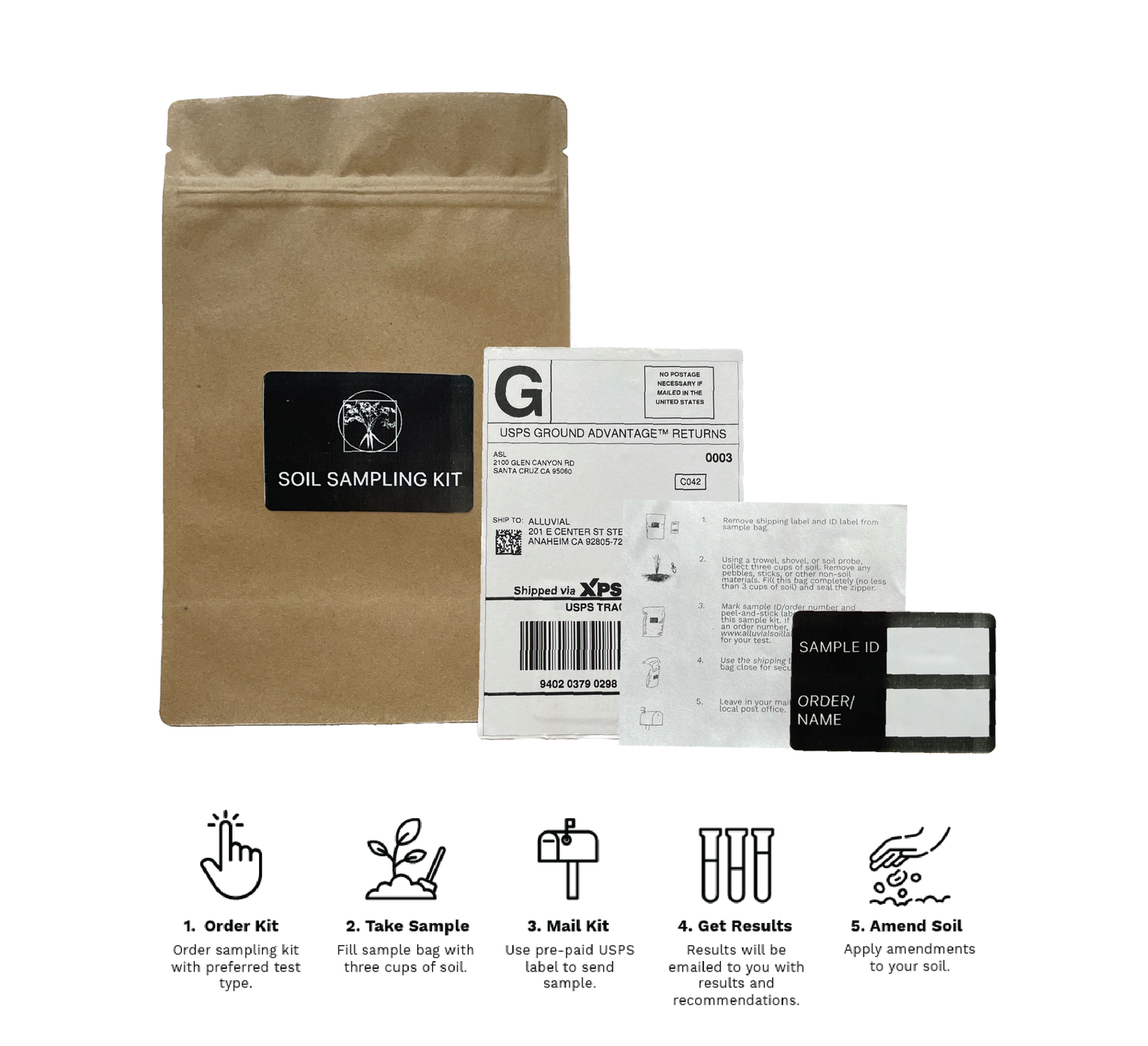Broad-spectrum Pesticide Analysis (378 analytes)
Broad-spectrum Pesticide Analysis (378 analytes)
The broad-spectrum pesticide screening is an in-depth analysis designed to detect a broad spectrum of pesticide residues in garden soil, assessing their potential impact on plant health and soil ecosystems. Pesticides, widely utilized in agricultural and gardening practices, can persist in soil, influencing plant growth, nutrient cycling, and microbial activity. This advanced test identifies the presence and concentrations of an extensive range of pesticide compounds, equipping gardeners and farmers with detailed knowledge to optimize pesticide use, enhance soil health, and safeguard plant vitality.
Couldn't load pickup availability
- Fast Turnaround Time
- Accurate Results
- Secure PCI/SSL Payment
- 30-Day Refunds
- Expert Recommendations
- Sustainable Packaging
Report includes:
- Visual data through graphs, detailed analyses, and actionable recommendations for optimizing soil health with organic or conventional solutions.
- A one-on-one, 15-minute consultation with an experienced soil scientist to review findings and chart a path forward.
Unpacking the Effects of Pesticides on Your Garden
Lingering Impact on Plant Growth:
Pesticide residues in soil can subtly affect plant health, altering growth patterns and productivity. Their persistence depends on the chemical’s properties, soil makeup, and environmental factors like climate and irrigation.
Microbial Ecosystem Disruption:
Pesticides often interfere with the microorganisms essential for a balanced soil environment. This disruption can compromise nutrient availability, affecting plant growth and reducing soil fertility over time.
Breakdown and Soil Quality:
The breakdown of pesticides varies, influenced by microbial activity, temperature, and moisture. A clear understanding of this process helps evaluate long-term impacts on soil structure and health.
Runoff Hazards and Exposure Risks:
Rain or irrigation can carry pesticide residues beyond the treated area, exposing nearby plants and ecosystems to unintended contamination. This underscores the importance of managing runoff effectively.
The Rise of Resistant Pests:
Repeated pesticide use can lead to the emergence of pests that are harder to control, leaving plants vulnerable and escalating the need for alternative management strategies.
Promoting Sustainable Pest Control:
Our findings emphasize the value of Integrated Pest Management (IPM), blending techniques like biological controls and crop rotation to reduce reliance on chemicals and support a healthier ecosystem.
Tailored Compatibility Analysis:
Different pesticides interact uniquely with soil types and plant species. Our report evaluates these relationships to ensure that plant health isn’t inadvertently compromised, helping you make well-informed decisions.
This screening goes beyond surface-level testing, offering a detailed, science-backed understanding of pesticide behavior in your garden soil and how it can shape the environment for years to come.
Sampling instructions
Sampling instructions
Materials Needed
i. Clean plastic bucket
ii. Shovel or soil probe
iii. Plastic bag
iv. Labeling materials (marker, tape, or label)
v. Gloves & mask (for contaminated soils)
Sampling Process
Step 1: Define Sampling Area
i. Identify the specific area for testing.
ii. Collect one composite sample per 1,000 sq. ft.
Step 2: Collect Soil Samples
i. Use a clean bucket and shovel/probe to gather soil from three spots.
ii. Dig 6 inches deep, taking a vertical slice.
iii. Avoid compost piles, pet waste, or fertilized areas.
iv. Do not sample wet soil.
Step 3: Prepare Sample
i. Remove debris, break up clumps, and mix soil thoroughly.
Step 4: Package Sample
i. Measure 3 cups of mixed soil into a resealable plastic bag.
ii. Label with Sample ID, Test Type, and Order Number.
Step 5: Submit Sample
i. Purchase a test on our website.
ii. Mail to Alluvial Soil Lab, 201 E Center St, Ste 112-3083, Anaheim, CA 92805.
iii. Use any postal carrier.
For Soil Sample Kit Users
Step 1: Prepare Kit
i. Remove shipping label, ID tag, and instructions.
Step 2: Collect & Package Sample
i. Follow the standard collection process.
ii. Fill the provided bag completely.
iii. Attach the ID tag and secure the shipping label.
Turnaround and Results
i. Timing depends on test type.
ii. Results emailed with soil composition, nutrients, and recommendations.
Safety Precautions
i. Wear gloves/mask when handling potentially contaminated soil.
ii. Wash hands thoroughly after sampling.
Following these steps ensures accurate soil testing for better gardening decisions.
Advanced details
Advanced details
Please contact us for the full list of pesticides.


Reviews
-

Jack Algiere | Stone Barns Center
Verified Purchase ✓
Alluvial Soil Lab provided us with comprehensive tests for our organic soil based greenhouse. The results were easy to read and will surely be a great tool for anyone looking to better understand their own soils.
-

Wilson H.
Verified Purchase ✓
I recently started a garden at a community plot, and wanted to know what was in my soil, so I could make more targeted amendments. Jake walked me through how to do so, and after sending my samples in... (read more)
-

Noah M.
Verified Purchase ✓
As a professional in the field I very much appreciate the timely and detailed report, along with skilled follow up communications. I will certainly use Alluvial Soil Lab's services again.
-

Zakary S.
Verified Purchase ✓
Great support and detailed report. Helped advise what options we had to plant trees! Plants are doing incredible! (read more)
-

Peggy C.
Verified Purchase ✓
I recently moved to a property with a vineyard, and wanted to know what type of fertilizers to use and how much to apply. So I did a soil test. I was new to soil testing and with Jake's help and instructions, I was able to successfully collect… (read more)
-

Adrian T.
Verified Purchase ✓
Alluvial makes complex scientific lab results accessible and legible for anyone.(read more)
-

Tom R.
Verified Purchase ✓
I wanted to start a vineyard on my land in Alpine, Ca. Unfortunately, it’s mostly clay. I contacted Alluvial and sent a soil sample...received a land rating with nutrient advice...the first test rows thrived, allowing me to plant more this Spring. Thank you! Couldn’t have done it without you. (read more)



